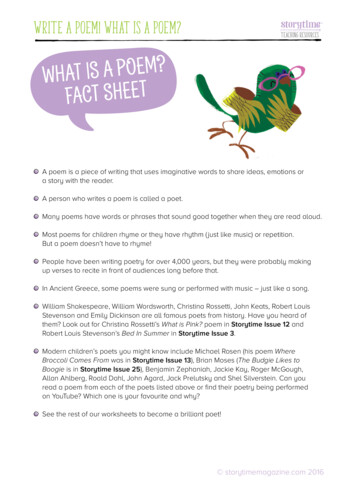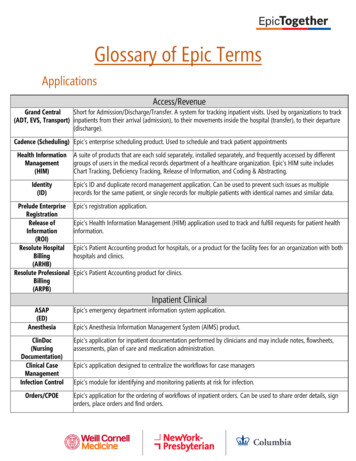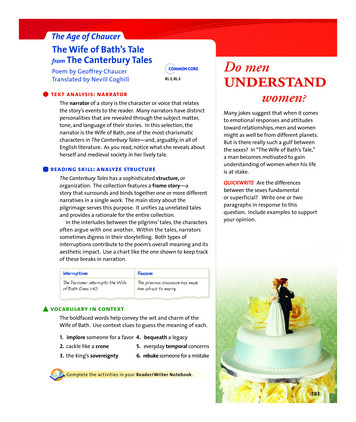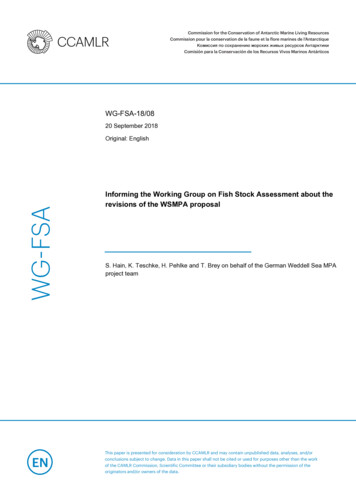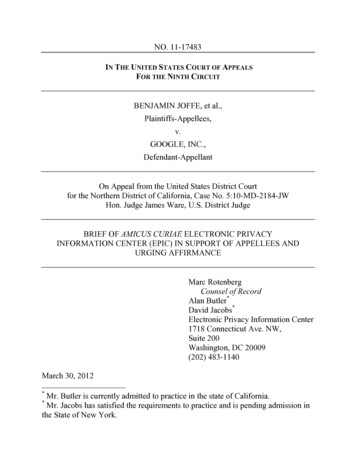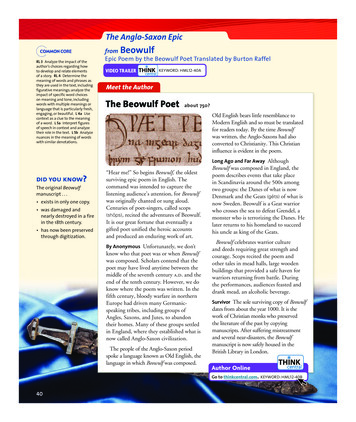
Transcription
The Anglo-Saxon EpicRL 3 Analyze the impact of theauthor’s choices regarding howto develop and relate elementsof a story. RL 4 Determine themeaning of words and phrases asthey are used in the text, includingfigurative meanings; analyze theimpact of specific word choiceson meaning and tone, includingwords with multiple meanings orlanguage that is particularly fresh,engaging, or beautiful. L 4a Usecontext as a clue to the meaningof a word. L 5a Interpret figuresof speech in context and analyzetheir role in the text. L 5b Analyzenuances in the meaning of wordswith similar denotations.did you know?The original Beowulfmanuscript . . . exists in only one copy. was damaged andnearly destroyed in a firein the 18th century. has now been preservedthrough digitization.from BeowulfEpic Poem by the Beowulf Poet Translated by Burton RaffelVIDEO TRAILERKEYWORD: HML12-40AMeet the AuthorThe Beowulf Poetabout 750?Old English bears little resemblance toModern English and so must be translatedfor readers today. By the time Beowulfwas written, the Anglo-Saxons had alsoconverted to Christianity. This Christianinfluence is evident in the poem.“Hear me!” So begins Beowulf, the oldestsurviving epic poem in English. Thecommand was intended to capture thelistening audience’s attention, for Beowulfwas originally chanted or sung aloud.Centuries of poet-singers, called scops(shIps), recited the adventures of Beowulf.It is our great fortune that eventually agifted poet unified the heroic accountsand produced an enduring work of art.By Anonymous Unfortunately, we don’tknow who that poet was or when Beowulfwas composed. Scholars contend that thepoet may have lived anytime between themiddle of the seventh century a.d. and theend of the tenth century. However, we doknow where the poem was written. In thefifth century, bloody warfare in northernEurope had driven many Germanicspeaking tribes, including groups ofAngles, Saxons, and Jutes, to abandontheir homes. Many of these groups settledin England, where they established what isnow called Anglo-Saxon civilization.The people of the Anglo-Saxon periodspoke a language known as Old English, thelanguage in which Beowulf was composed.Long Ago and Far Away AlthoughBeowulf was composed in England, thepoem describes events that take placein Scandinavia around the 500s amongtwo groups: the Danes of what is nowDenmark and the Geats (gCts) of what isnow Sweden. Beowulf is a Geat warriorwho crosses the sea to defeat Grendel, amonster who is terrorizing the Danes. Helater returns to his homeland to succeedhis uncle as king of the Geats.Beowulf celebrates warrior cultureand deeds requiring great strength andcourage. Scops recited the poem andother tales in mead halls, large woodenbuildings that provided a safe haven forwarriors returning from battle. Duringthe performances, audiences feasted anddrank mead, an alcoholic beverage.Survivor The sole surviving copy of Beowulfdates from about the year 1000. It is thework of Christian monks who preservedthe literature of the past by copyingmanuscripts. After suffering mistreatmentand several near-disasters, the Beowulfmanuscript is now safely housed in theBritish Library in London.Author OnlineGo to thinkcentral.com. KEYWORD: HML12-40B40NA L12PE-u01s11-brBeowul.indd4012/15/107:27:43 PM
text analysis: characteristics of an epicAn epic, a long narrative poem that traces the adventures ofa great hero, has the power to transport you to another timeand place. Beowulf takes you to the Anglo-Saxon period andthe land of the Danes and the Geats, where a mighty warriorbattles fantastic monsters. As you read the poem, note someof the following characteristics of epic poetry: The hero is a legendary figure who performs deeds requiringincredible courage and strength. The hero embodies character traits that reflect lofty ideals. The poet uses formal diction and a serious tone. The poem reflects timeless values and universal themes.reading strategy: reading old english poetryOld English poetry is marked by a strong rhythm that is easy tochant or sing. Here are some of the techniques used in an OldEnglish poem: alliteration, or the repetition of consonant sounds at thebeginning of words, which helps unify the linesWhere domonsterslurk?Unlike the monsters in Beowulf, thosein our world are not always easy toidentify. Evil can hide in the mostunexpected places: behind a smilingface, between the lines of a law, inotherwise noble-sounding words. Evenwhen evil is clearly exposed, people maydisagree on how to confront it.QUICKWRITE What does evil mean toyou? Write your own definition of theword, and provide some examples ofreal-life monsters.So mankind’s enemy continued his crimes caesura (sG-zhMrPE), or a pause dividing each line, with eachpart having two accented syllables to help maintain therhythm of the linesHe took what he wanted, // all the treasures kenning, a metaphorical compound word or phrasesubstituted for a noun or name, which enhances meaning—for example, “mankind’s enemy” used in place of “Grendel”As you read Beowulf, note examples of these techniques andconsider their effect on rhythm and meaning in the poem.vocabulary in contextThe words shown here help convey the monstrous forcesBeowulf faces in the epic. Choose a word from the list thathas the same definition as each numbered item.wordlist1. hsome2. burden3. notorious4. cramComplete the activities in your Reader/Writer Notebook.beowulfNA L12PE-u01s11-brBeowul.indd414111/22/1011:59:41 AM
Hrothgar (hrôthPgärQ), king of the Danes, has built a wonderful mead hall calledHerot (hDrQEt), where his subjects congregate and make merry. As this selectionopens, a fierce and powerful monster named Grendel invades the mead hall,bringing death and destruction.grendel51042A powerful monster, living downIn the darkness, growled in pain, impatient aAs day after day the music rangLoud in that hall, the harp’s rejoicingCall and the poet’s clear songs, sungOf the ancient beginnings of us all, recallingThe Almighty making the earth, shapingThese beautiful plains marked off by oceans,Then proudly setting the sun and moonTo glow across the land and light it;The corners of the earth were made lovely with treesAnd leaves, made quick with life, with eachOf the nations who now move on its face. And thenAs now warriors sang of their pleasure:a OLD ENGLISH POETRYReread lines 1–2 aloud. Noticethe use of alliteration with therepetition of the letters p and d.What mood, or feeling, does thealliteration convey?Analyze VisualsExamine the composition, orarrangement of shapes, in thisphotograph. How does theangle of the photo contribute toits impact?unit 1: the anglo-saxon and medieval periodsNA L12PE-u01s11-Beowul.indd4211/22/1012:01:06 PM
beowulfNA L12PE-u01s11-Beowul.indd434311/22/1012:01:25 PM
15202530354045505544So Hrothgar’s men lived happy in his hallTill the monster stirred, that demon, that fiend,Grendel, who haunted the moors, the wildMarshes, and made his home in a hellNot hell but earth. He was spawned in that slime,Conceived by a pair of those monsters bornOf Cain, murderous creatures banishedBy God, punished forever for the crimeOf Abel’s death. The Almighty droveThose demons out, and their exile was bitter,Shut away from men; they splitInto a thousand forms of evil—spiritsAnd fiends, goblins, monsters, giants,A brood forever opposing the Lord’sWill, and again and again defeated. bThen, when darkness had dropped, GrendelWent up to Herot, wondering what the warriorsWould do in that hall when their drinking was done.He found them sprawled in sleep, suspectingNothing, their dreams undisturbed. The monster’sThoughts were as quick as his greed or his claws:He slipped through the door and there in the silenceSnatched up thirty men, smashed themUnknowing in their beds and ran out with their bodies,The blood dripping behind him, backTo his lair, delighted with his night’s slaughter.At daybreak, with the sun’s first light, they sawHow well he had worked, and in that gray morningBroke their long feast with tears and lamentsFor the dead. Hrothgar, their lord, sat joylessIn Herot, a mighty prince mourningThe fate of his lost friends and companions,Knowing by its tracks that some demon had tornHis followers apart. He wept, fearingThe beginning might not be the end. And that night cGrendel came again, so setOn murder that no crime could ever be enough,No savage assault quench his lustFor evil. Then each warrior triedTo escape him, searched for rest in differentBeds, as far from Herot as they could find,Seeing how Grendel hunted when they slept.Distance was safety; the only survivorsWere those who fled him. Hate had triumphed.17 moors (mMrz): broad, openregions with patches of bog.19 spawned: given birth to.21 Cain: the eldest son of Adam andEve. According to the Bible (Genesis 4),he murdered his younger brother Abel.b EPICNote the description in lines23–29 of supernatural creaturesthat are “again and againdefeated.” What universaltheme might these linessuggest?lair (lâr) n. the den or restingplace of a wild animalcEPICWhat is the tone of lines 44–49?What words and details conveythis tone?unit 1: the anglo-saxon and medieval periodsNA L12PE-u01s11-Beowul.indd4411/22/1012:01:31 PM
6065707580859095100So Grendel ruled, fought with the righteous,One against many, and won; so HerotStood empty, and stayed deserted for years,Twelve winters of grief for Hrothgar, kingOf the Danes, sorrow heaped at his doorBy hell-forged hands. His misery leaped dThe seas, was told and sung in allMen’s ears: how Grendel’s hatred began,How the monster relished his savage warOn the Danes, keeping the bloody feudAlive, seeking no peace, offeringNo truce, accepting no settlement, no priceIn gold or land, and paying the livingFor one crime only with another. No oneWaited for reparation from his plundering claws:That shadow of death hunted in the darkness,Stalked Hrothgar’s warriors, oldAnd young, lying in waiting, hiddenIn mist, invisibly following them from the edgeOf the marsh, always there, unseen.So mankind’s enemy continued his crimes,Killing as often as he could, comingAlone, bloodthirsty and horrible. Though he livedIn Herot, when the night hid him, he neverDared to touch king Hrothgar’s gloriousThrone, protected by God—God,Whose love Grendel could not know. But Hrothgar’sHeart was bent. The best and most nobleOf his council debated remedies, satIn secret sessions, talking of terrorAnd wondering what the bravest of warriors could do.And sometimes they sacrificed to the old stone gods,Made heathen vows, hoping for Hell’sSupport, the Devil’s guidance in drivingTheir affliction off. That was their way,And the heathen’s only hope, HellAlways in their hearts, knowing neither GodNor His passing as He walks through our world, the LordOf Heaven and earth; their ears could not hearHis praise nor know His glory. Let themBeware, those who are thrust into danger,Clutched at by trouble, yet can carry no solaceIn their hearts, cannot hope to be better! HailTo those who will rise to God, drop offTheir dead bodies and seek our Father’s peace!d OLD ENGLISH POETRYWhat does the kenning “hellforged hands” in line 64 suggestabout Grendel?73 reparation: something done tomake amends for loss or suffering.In Germanic society, someone whokilled another person was generallyexpected to make a payment to thevictim’s family as a way of restoringpeace.84 The reference to God showsthe influence of Christianity on theBeowulf Poet.91 heathen (hCPthEn): pagan; nonChristian. Though the Beowulf Poetwas a Christian, he recognized thatthe characters in the poem livedbefore the Germanic tribes wereconverted to Christianity, when theystill worshiped “the old stone gods.”affliction (E-flGkPshEn) n. aforce that oppresses or causessufferingbeowulfNA L12PE-u01s11-Beowul.indd454511/22/1012:01:32 PM
beowulf10511011512046So the living sorrow of Healfdane’s sonSimmered, bitter and fresh, and no wisdomOr strength could break it: that agony hungOn king and people alike, harshAnd unending, violent and cruel, and evil.In his far-off home Beowulf, Higlac’sFollower and the strongest of the Geats—greaterAnd stronger than anyone anywhere in this world—Heard how Grendel filled nights with horrorAnd quickly commanded a boat fitted out,Proclaiming that he’d go to that famous king,Would sail across the sea to Hrothgar,Now when help was needed. NoneOf the wise ones regretted his going, muchAs he was loved by the Geats: the omens were good,And they urged the adventure on. So BeowulfChose the mightiest men he could find,The bravest and best of the Geats, fourteenIn all, and led them down to their boat;The Oseberg Ship (850), Viking. Viking Ship Museum, Bygdoy,Norway. Werner Forman/Art Resource, New York.104 Healfdane’s son: Hrothgar.109–110 Higlac’s follower: a warriorloyal to Higlac (hGgPlBkQ), king of theGeats (and Beowulf’s uncle).unit 1: the anglo-saxon and medieval periodsNA L12PE-u01s11-Beowul.indd4611/22/1012:01:32 PM
He knew the sea, would point the prowStraight to that distant Danish shore. . . . eBeowulf and his men sail over the sea to the land of the Danes to offerhelp to Hrothgar. They are escorted by a Danish guard to Herot, whereWulfgar, one of Hrothgar’s soldiers, tells the king of their arrival. Hrothgarknows of Beowulf and is ready to welcome the young prince and his men.125130135140145150155Then Wulfgar went to the door and addressedThe waiting seafarers with soldier’s words:“My lord, the great king of the Danes, commands meTo tell you that he knows of your noble birthAnd that having come to him from over the openSea you have come bravely and are welcome.Now go to him as you are, in your armor and helmets,But leave your battle-shields here, and your spears,Let them lie waiting for the promises your wordsMay make.”Beowulf arose, with his menAround him, ordering a few to remainWith their weapons, leading the others quicklyAlong under Herot’s steep roof into Hrothgar’sPresence. Standing on that prince’s own hearth,Helmeted, the silvery metal of his mail shirtGleaming with a smith’s high art, he greetedThe Danes’ great lord:“Hail, Hrothgar!Higlac is my cousin and my king; the daysOf my youth have been filled with glory. Now Grendel’sName has echoed in our land: sailorsHave brought us stories of Herot, the bestOf all mead-halls, deserted and useless when the moonHangs in skies the sun had lit,Light and life fleeing together.My people have said, the wisest, most knowingAnd best of them, that my duty was to go to the Danes’Great king. They have seen my strength for themselves,Have watched me rise from the darkness of war,Dripping with my enemies’ blood. I droveFive great giants into chains, chasedAll of that race from the earth. I swamIn the blackness of night, hunting monstersOut of the ocean, and killing them oneRL 3eEPICAn epic is a long narrative poemthat traces the adventures of agreat hero. Almost all nationalcultures have their own epics,whose stories and heroes playa role in defining the nationalcharacter. An epic may describehow a nation was establishedor highlight specific traitsassociated with its people. Readlines 109–124. At what point inthe story is Beowulf introduced?What traits of an epic hero doeshe appear to possess? Whichtraits of Beowulf’s might alsobe used to describe the Britishpeople and their origins?139 mail shirt: flexible body armormade of metal links or overlappingmetal scales.140 smith’s high art: the skilledcraft of a blacksmith (a person whofashions objects from iron).142 cousin: here, a general term for arelative. Beowulf is actually Higlac’snephew.beowulfNA L12PE-u01s11-Beowul.indd474711/22/1012:01:38 PM
16016517017518018519019548By one; death was my errand and the fateThey had earned. Now Grendel and I are called fTogether, and I’ve come. Grant me, then,Lord and protector of this noble place,A single request! I have come so far,Oh shelterer of warriors and your people’s loved friend,That this one favor you should not refuse me—That I, alone and with the help of my men,May purge all evil from this hall. I have heard,Too, that the monster’s scorn of menIs so great that he needs no weapons and fears none.Nor will I. My lord HiglacMight think less of me if I let my swordGo where my feet were afraid to, if I hidBehind some broad linden shield: my handsAlone shall fight for me, struggle for lifeAgainst the monster. God must decideWho will be given to death’s cold grip.Grendel’s plan, I think, will beWhat it has been before, to invade this hallAnd gorge his belly with our bodies. If he can,If he can. And I think, if my time will have come,There’ll be nothing to mourn over, no corpse to prepareFor its grave: Grendel will carry our bloodyFlesh to the moors, crunch on our bonesAnd smear torn scraps of our skin on the wallsOf his den. No, I expect no DanesWill fret about sewing our shrouds, if he wins.And if death does take me, send the hammeredMail of my armor to Higlac, returnThe inheritance I had from Hrethel, and heFrom Wayland. Fate will unwind as it must!”Hrothgar replied, protector of the Danes:“Beowulf, you’ve come to us in friendship, and becauseOf the reception your father found at our court.Edgetho had begun a bitter feud,Killing Hathlaf, a Wulfing warrior:Your father’s countrymen were afraid of war,If he returned to his home, and they turned him away.Then he traveled across the curving wavesTo the land of the Danes. I was new to the throne,Then, a young man ruling this widefEPICNotice that in lines 153–159,Beowulf boasts about pastvictories that requiredsuperhuman strength andcourage. Why might the peopleof Beowulf’s time have valuedsuch traits?purge (pûrj) v. to cleanse or rid ofsomething undesirable172 linden shield: a shield madefrom the wood of a linden tree.172–174 Beowulf insists on fightingGrendel without weapons.gorge (gôrj) v. to stuff withfood; glut185 shrouds: cloths in which deadbodies are wrapped.188 Hrethel (hrDthPEl): a former kingof the Geats—Higlac’s father andBeowulf’s grandfather.189 Wayland: a famous blacksmithand magician.193 Edgetho (DjPthI): Beowulf’s father.194 Wulfing: a member of anotherGermanic tribe.unit 1: the anglo-saxon and medieval periodsNA L12PE-u01s11-Beowul.indd4811/22/1012:01:39 PM
200205210215220225230Kingdom and its golden city: Hergar,My older brother, a far better manThan I, had died and dying made me,Second among Healfdane’s sons, firstIn this nation. I bought the end of Edgetho’sQuarrel, sent ancient treasures through the ocean’sFurrows to the Wulfings; your father sworeHe’d keep that peace. My tongue grows heavy,And my heart, when I try to tell you what GrendelHas brought us, the damage he’s done, hereIn this hall. You see for yourself how much smaller gOur ranks have become, and can guess what we’ve lostTo his terror. Surely the Lord AlmightyCould stop his madness, smother his lust!How many times have my men, glowingWith courage drawn from too many cupsOf ale, sworn to stay after darkAnd stem that horror with a sweep of their swords.And then, in the morning, this mead-hall glitteringWith new light would be drenched with blood, the benchesStained red, the floors, all wet from that fiend’sSavage assault—and my soldiers would be fewerStill, death taking more and more.But to table, Beowulf, a banquet in your honor:Let us toast your victories, and talk of the future.” hThen Hrothgar’s men gave places to the Geats,Yielded benches to the brave visitorsAnd led them to the feast. The keeper of the meadCame carrying out the carved flasks,And poured that bright sweetness. A poetSang, from time to time, in a clearPure voice. Danes and visiting GeatsCelebrated as one, drank and rejoiced. . . .g OLD ENGLISH POETRYObserve that as Hrothgar beginsto speak about Grendel in lines207–210, his tone, or his attitudetoward his subject, becomesbleak and despairing. Whatrepeated sounds does the poetuse to suggest this tone?h EPICNote that Hrothgar deliversa long speech to Beowulf inlines 190–224. What values arereflected in the speech?beowulfNA L12PE-u01s11-Beowul.indd494911/22/1012:01:40 PM
the battle with grendelAfter the banquet, Hrothgar and his followers leave Herot, and Beowulf and hiswarriors remain to spend the night. Beowulf reiterates his intent to fight Grendelwithout a sword and, while his followers sleep, lies waiting, eager for Grendelto appear.23524024550Out from the marsh, from the foot of mistyHills and bogs, bearing God’s hatred,Grendel came, hoping to kill iAnyone he could trap on this trip to high Herot.He moved quickly through the cloudy night,Up from his swampland, sliding silentlyToward that gold-shining hall. He had visited Hrothgar’sHome before, knew the way—But never, before nor after that night,Found Herot defended so firmly, his receptionSo harsh. He journeyed, forever joyless,Straight to the door, then snapped it open,Tore its iron fasteners with a touchiOLD ENGLISH POETRYReread lines 233–235. Noticethat the translator usespunctuation to convey theeffect of the midline pauses, orcaesuras, in the lines. In whatway does the rhythm created bythe pauses reinforce the actionrecounted here?unit 1: the anglo-saxon and medieval periodsNA L12PE-u01s11-Beowul.indd5011/22/1012:01:40 PM
250255260265270275280285And rushed angrily over the threshold.He strode quickly across the inlaidFloor, snarling and fierce: his eyesGleamed in the darkness, burned with a gruesomeLight. Then he stopped, seeing the hallCrowded with sleeping warriors, stuffedWith rows of young soldiers resting together.And his heart laughed, he relished the sight,Intended to tear the life from those bodiesBy morning; the monster’s mind was hotWith the thought of food and the feasting his bellyWould soon know. But fate, that night, intendedGrendel to gnaw the broken bonesOf his last human supper. HumanEyes were watching his evil steps,Waiting to see his swift hard claws.Grendel snatched at the first GeatHe came to, ripped him apart, cutHis body to bits with powerful jaws,Drank the blood from his veins and boltedHim down, hands and feet; deathAnd Grendel’s great teeth came together,Snapping life shut. Then he stepped to anotherStill body, clutched at Beowulf with his claws,Grasped at a strong-hearted wakeful sleeper—And was instantly seized himself, clawsBent back as Beowulf leaned up on one arm.That shepherd of evil, guardian of crime,Knew at once that nowhere on earthHad he met a man whose hands were harder;His mind was flooded with fear—but nothingCould take his talons and himself from that tightHard grip. Grendel’s one thought was to runFrom Beowulf, flee back to his marsh and hide there:This was a different Herot than the hall he had emptied.But Higlac’s follower remembered his finalBoast and, standing erect, stoppedThe monster’s flight, fastened those clawsIn his fists till they cracked, clutched GrendelCloser. The infamous killer foughtFor his freedom, wanting no flesh but retreat,Desiring nothing but escape; his clawsHad been caught, he was trapped. That trip to HerotWas a miserable journey for the writhing monster!246 threshold: the strip of wood orstone at the bottom of a doorway.talon (tBlPEn) n. a claw278–289 Up to this point Grendelhas killed his human victims easily.infamous (GnPfE-mEs) adj. havinga very bad reputationbeowulfNA L12PE-u01s11-Beowul.indd515111/22/1012:01:47 PM
29029530030531031532032533052The high hall rang, its roof boards swayed,And Danes shook with terror. DownThe aisles the battle swept, angryAnd wild. Herot trembled, wonderfullyBuilt to withstand the blows, the strugglingGreat bodies beating at its beautiful walls;Shaped and fastened with iron, insideAnd out, artfully worked, the buildingStood firm. Its benches rattled, fellTo the floor, gold-covered boards gratingAs Grendel and Beowulf battled across them. jHrothgar’s wise men had fashioned HerotTo stand forever; only fire,They had planned, could shatter what such skill had putTogether, swallow in hot flames such splendorOf ivory and iron and wood. SuddenlyThe sounds changed, the Danes startedIn new terror, cowering in their beds as the terribleScreams of the Almighty’s enemy sangIn the darkness, the horrible shrieks of painAnd defeat, the tears torn out of Grendel’sTaut throat, hell’s captive caught in the armsOf him who of all the men on earthWas the strongest.That mighty protector of menMeant to hold the monster till its lifeLeaped out, knowing the fiend was no useTo anyone in Denmark. All of Beowulf ’sBand had jumped from their beds, ancestralSwords raised and ready, determinedTo protect their prince if they could. Their courageWas great but all wasted: they could hack at GrendelFrom every side, trying to openA path for his evil soul, but their pointsCould not hurt him, the sharpest and hardest ironCould not scratch at his skin, for that sin-stained demonHad bewitched all men’s weapons, laid spellsThat blunted every mortal man’s blade.And yet his time had come, his daysWere over, his death near; downTo hell he would go, swept groaning and helplessTo the waiting hands of still worse fiends.jOLD ENGLISH POETRYReread lines 293–300. Whatimpression of the battle does thealliteration help convey?L 4aLanguage CoachHomophones Many word pairssound alike but have differentspellings and meanings. Forexample, taught is the past tenseof teach. Which word in line 311 isa homophone for taught? Guessthe word’s meaning using thesurrounding text.unit 1: the anglo-saxon and medieval periodsNA L12PE-u01s11-Beowul.indd5211/22/1012:01:48 PM
335340345350355360365370Now he discovered—once the afflictorOf men, tormentor of their days—what it meantTo feud with Almighty God: GrendelSaw that his strength was deserting him, his clawsBound fast, Higlac’s brave follower tearing atHis hands. The monster’s hatred rose higher,But his power had gone. He twisted in pain,And the bleeding sinews deep in his shoulderSnapped, muscle and bone splitAnd broke. The battle was over, BeowulfHad been granted new glory: Grendel escaped,But wounded as he was could flee to his den,His miserable hole at the bottom of the marsh,Only to die, to wait for the endOf all his days. And after that bloodyCombat the Danes laughed with delight.He who had come to them from across the sea,Bold and strong-minded, had driven afflictionOff, purged Herot clean. He was happy,Now, with that night’s fierce work; the DanesHad been served as he’d boasted he’d serve them; Beowulf,A prince of the Geats, had killed Grendel,Ended the grief, the sorrow, the sufferingForced on Hrothgar’s helpless peopleBy a bloodthirsty fiend. No Dane doubtedThe victory, for the proof, hanging highFrom the rafters where Beowulf had hung it, was the monster’sArm, claw and shoulder and all.338 sinews (sGnPyLz): the tendonsthat connect muscles to bones.And then, in the morning, crowds surroundedHerot, warriors coming to that hallFrom faraway lands, princes and leadersOf men hurrying to behold the monster’sGreat staggering tracks. They gaped with no senseOf sorrow, felt no regret for his suffering,Went tracing his bloody footprints, his beatenAnd lonely flight, to the edge of the lakeWhere he’d dragged his corpselike way, doomedAnd already weary of his vanishing life.The water was bloody, steaming and boilingIn horrible pounding waves, heatSucked from his magic veins; but the swirlingSurf had covered his death, hiddenbeowulfNA L12PE-u01s11-Beowul.indd535311/22/1012:01:49 PM
375380385390395Deep in murky darkness his miserableEnd, as hell opened to receive him. kThen old and young rejoiced, turned backFrom that happy pilgrimage, mounted their hard-hoovedHorses, high-spirited stallions, and rode themSlowly toward Herot again, retellingBeowulf ’s bravery as they jogged along.And over and over they swore that nowhereOn earth or under the spreading skyOr between the seas, neither south nor north,Was there a warrior worthier to rule over men.(But no one meant Beowulf ’s praise to belittleHrothgar, their kind and gracious king!)And sometimes, when the path ran straight and clear,They would let their horses race, redAnd brown and pale yellow backs streamingDown the road. And sometimes a proud old soldierWho had heard songs of the ancient heroesAnd could sing them all through, story after story,Would weave a net of words for Beowulf ’sVictory, tying the knot of his versesSmoothly, swiftly, into place with a poet’sQuick skill, singing his new song aloudWhile he shaped it, and the old songs as well. . . . lk GRAMMAR AND STYLETo capture a scene, the poetoften uses vivid imagery. Noticethe use in lines 369–374, forexample, of adjectives such asbloody, steaming, pounding, andswirling to help readers see andfeel the violent, churning water.lOLD ENGLISH POETRYReread lines 389–396. In whatways does this descriptionreflect the techniques used byAnglo-Saxon poets? Cite details.Text Analysis1. Clarify Why does Beowulf journey across the sea to the land ofthe Danes?2. Summarize How does Beowulf trap and kill Grendel?3. Analyze Motivation What drives Grendel to attack so manymen at Herot, the mead hall?4. Make Inferences Why does Beowulf hang Grendel’s arm fromthe rafters of Herot?54unit 1: the anglo-saxon and medieval periodsNA L12PE-u01s11-Beowul.indd5411/22/1012:01:49 PM
grendel’s motherAlthough one monster has died, another still lives. From her lair in acold and murky lake, where she has been brooding over her loss, Grendel’smother emerges, bent on revenge.400405410415So she reached Herot,Where the Danes slept as though already dead;Her visit ended their good fortune, reversedThe bright vane of their luck. No female, no matterHow fierce, could have come with a man’s strength,Fought with the power and courage men fight with,Smashing their shining swords, their bloody,Hammer-forged blades onto boar-headed helmets,Slashing and stabbing with the sharpest of points.The soldiers raised their shields and drewThose gleaming swords, swung them aboveThe piled-up benches, leaving their mail shirtsAnd their h
real-life monsters. text analysis: characteristics of an epic An epic, a long narrative poem that traces the adventures of a great hero, has the power to transport you to another time and place. Beowulf takes you to the Anglo-Saxon period and the land of the Danes and the
